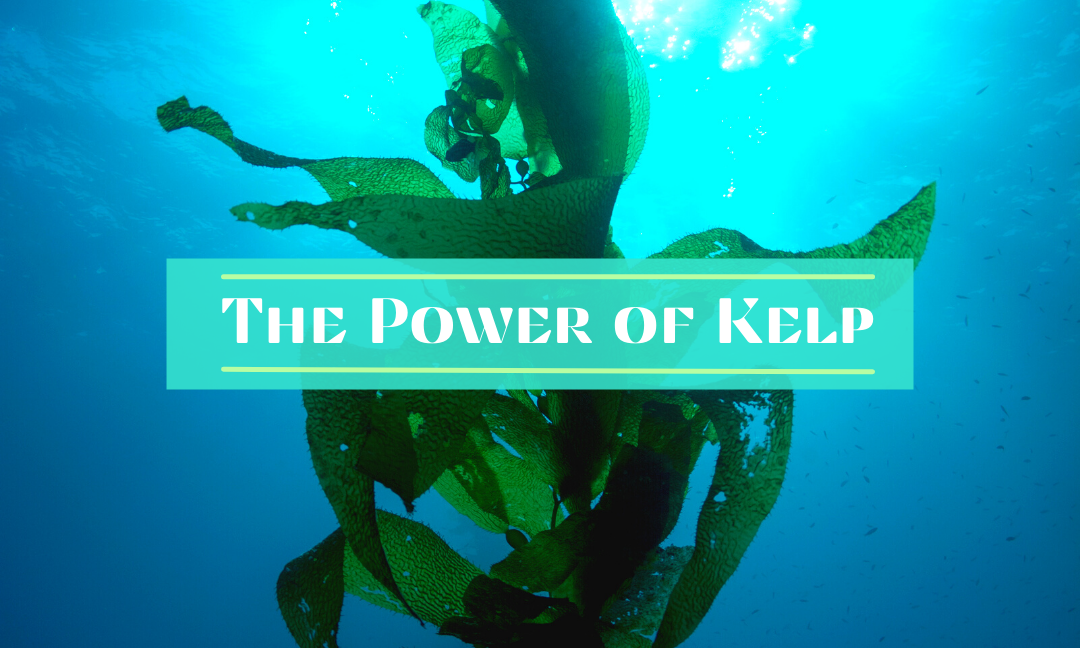Author: Amelia Ell
Editor: Emily Cheng
Graphic Designer: Alessia Carpino
Publisher: Rayna Almas
The term “renewable energy” brings to mind images of rooftop solar panels or wide fields of wind turbines. Now, thanks to new advances in biofuel research, we could be looking to the ocean to support our energy needs. Researchers have discovered that kelp could prove to be a great source of biofuel. With rising energy demands and environmentalists advocating for green sources, the global biofuel market is projected to reach $246.52 billion by 2024. But what makes biofuel so different from natural gas or petroleum?

Kelpanol vs. Traditional Fossil fuels:
Ethanol—a common type of liquid biofuel—is created by fermenting naturally grown sugars from crops until they become alcohol. When ethanol is made from fermented seaweed, the product can be dubbed “kelpanol.” Either way, replacing gasoline with ethanol reduces carbon monoxide emissions by up to 30%. Not only that, but ethanol doesn’t promote fuel usage in the same way that non-renewable sources do. Contrary to fossil fuels, crop production is profitable both as energy and food so there is no advantage to promoting combustion transportation. It is simply a supplement to reduce current consumption of more dangerous types of fuel as they are gradually phased out. Moreover, its extraction process doesn’t pose the same risk of spills or ecosystem damage.
That said, kelp isn’t just any old biofuel. In fact, it holds a variety of advantages over corn, sugar cane, and oil seeds—some of the current standards for producing ethanol.

Is Kelp the New Corn?
Unlike terrestrial plants, kelp offers a space-efficient, low-input solution to produce ethanol.
Perhaps the most obvious benefit of farming marine plants is that they don’t require any irrigation. In fact, ocean plants don’t require any use of fresh water at all! The same could be said for land usage, which means that precious habitats don’t need to be demolished to create a farm. On top of that, there’s no need for artificial fertilizer or pesticides. As opposed to something like corn, kelp is a perennial and consequently cuts the need for ploughing and replanting.
Being a candidate for ethanol, kelp can help us go local with our energy needs. Setting up seaweed fuel production on Canadian shores like the ones in BC could replace the imported ethanol we use in gasoline additives. Sugar kelp also grows faster and actually requires less processing than land crops. It’s easier to break down because it does not contain lignin (a material that supports the structure of plants), something that is only necessary if the plant needs to resist the pressure of gravity.

The Kelp Elevator:
For kelp to become a major source of biofuel, we’re going to need more than just small farms on the coast. Since more than 70% of the Earth’s surface is covered in ocean, we certainly have the space. However, the deep ocean floors and inefficient processes make farming a struggle.
Off the shores of Catalina Island, researchers are developing a new method of growing kelp that will help increase output. This “kelp elevator” is a method of transporting the seaweed between a cycle of high and low depths in the ocean. During the day, kelp is brought closer to the surface to be exposed to sunlight. Every night, it’s pulled to the deeper areas where the nutrients are more dense. This solar-powered daily rotation can produce 4 times more biomass than regular kelp fields.
Some projections even claim that a perfected system of kelp farming could provide around 10% of the world’s energy needs. Although it may be a while before this dream becomes a reality, it will not be a surprise if the term “kelp” soon becomes synonymous with the energy of the future.
Sources:
https://weww.uvic.ca/knowledge/archives/2014/v14n03-march14.php
https://lbpost.com/news/kelp-fuel-biofuel-cultivation-technology-oil
https://www.sciencedaily.com/releases/2021/03/210302094053.htm
https://www.eia.gov/energyexplained/biofuels/ethanol.php
All images sourced from Pixabay

